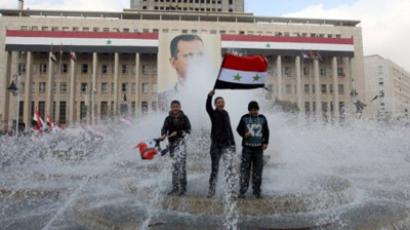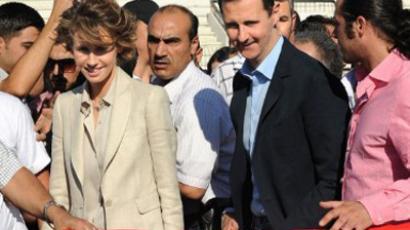Moscow won’t support a “raw” resolution or arms embargo on Syria
Russia’s Ambassador to the United Nations Vitaly Churkin said an embargo on arms supplies to Syria is out of the question – along with any resolution that could threaten to aggravate conflict in the country.
Churkin, speaking to journalists via video link, spoke out strongly against a possible arms embargo on Syria, citing some countries' refusal to condemn the armed groups operating there, and the continued risk of weapons supplies reaching these groups despite any ban. "It seems logical: if there is a conflict, let's not deliver arms. But we saw what happened in Libya," Churkin said. "It was forbidden to deliver arms to the government, but everyone under the sun delivered to armed opposition groups; that is what it meant in reality. How then can we break contracts, our years-old relationship with Syria … especially when what we are delivering cannot be used to shoot demonstrators.” Churkin also said that forcing Security Council members work with "raw" resolutions would be “incorrect and counterproductive.” This, of course, is only the latest page in the ongoing diplomatic battle over the conflict in Syria. Those in favor of the Western-sponsored draft resolution are calling for Syria’s President Bashar al-Assad to step down, the release of all prisoners and the withdrawal of troops from Syrian cities, among other things.Russia and China are the only permanent UNSC members to vote against the draft, reminding others that it is not the place of the international community to meddle in Syria’s domestic affairs, and warning against a possible repeat of the military invasion in Libya last year. Ambassador Churkin reiterated Russia’s position, saying that no concessions would be made regarding foreign intervention of any kind in Syria. He also took the time to draw the reporters’ attention to the fact many UNSC members are apparently ignoring the League of Arab States observer mission report on Syria.
Russia: why send observer mission if its report will be ignored?
Churkin devoted a lot of his time to the Arab League mission in Syria, and its report – which, according to the ambassador, many Security Council members were happy to overlook. Churkin said that many questioned the necessity of listening to the mission’s chief, Sudanese General ad-Dabi, but at Russia’s insistence, the general will address the UNSC and the observer mission report will be translated into all six official United Nations languages. Churkin said that any resolution to be passed by the Security Council must take into account the findings of the observer mission, and that Council members must remember that as with any armed conflict, there is an information war going on in Syria. “We all understand that in conflict situations like these – for a long time now – there is an information war going on as well. Different media resources are being used to present information in a biased way. And the Syrian conflict is ongoing partly because the information that comes out is often very biased.”The Arab League observer mission spent a month in Syria, after which Syrian authorities extended their stay for another month. Overall, approximately 100 observers toured the country in the hopes that their presence would help stop the bloodshed that began in March 2010, when protesters rose up against President Assad’s government. Their mission, criticized by many for failing to provide any tangible results, was halted last week amid escalating violence in Syria – but the observers remain in the country, hoping to continue their work. Overall, the diplomat said that Russia won’t soften its stance on issues it considers key – but still hopes for a peaceful solution to the crisis. "I feel inspired that our partners, knowing our 'red lines', still say 'we will work to achieve a consensus,” Russia’s UN envoy told journalists from New York. The previous UNSC session, held on Tuesday, saw heated debates and calls for stopping “the Syrian killing machine.” Numerous accusations of crimes against its population were leveled against the Assad government, justifying the rallying cry of “Assad must go” voiced by Western countries and their allies for several months now.
‘Sovereignty for friends, compliance for enemies’
When most nations talk about sovereignty, they seem to think that "sovereignty is good for friends" while "compliance is good for enemies," believes Benjamin Barber, a senior fellow at the American think-tank Demos.“Right now, Russia is defending the sovereignty of Syria,” he said. “Whether it would defend the sovereignty of other nations less friendly to its interests is unclear. But in the meantime, the US and the West generally – and many Arab countries like Qatar – are in effect saying, ‘Syria has no right to sovereignty. It’s the role of the United Nations to force compliance with their directives.’”“They are now calling for regime change, and that does seem to exceed any reasonable standard of the sovereign rights of the country to make its own decisions about the government,” he added.














